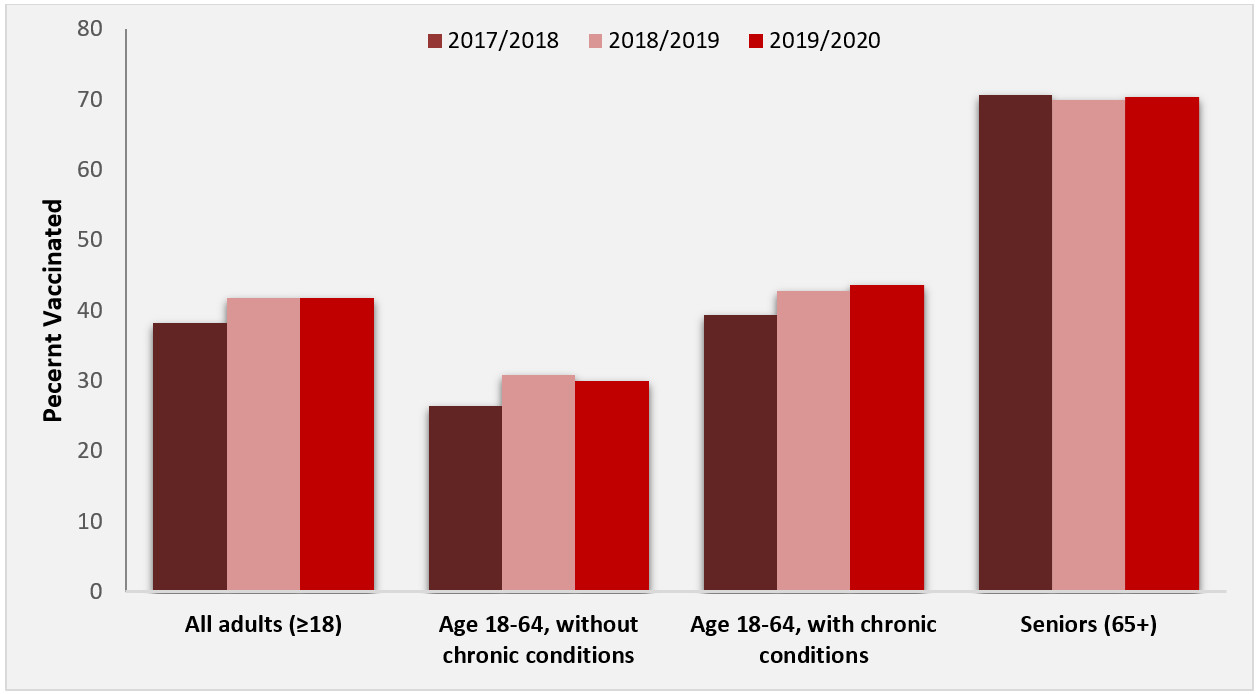Seasonal Influenza (Flu) Vaccination Coverage Survey Results, 2019-2020
The Seasonal Influenza Vaccination Coverage Survey is a yearly telephone survey that collects information about the flu shot in Canada. Each flu season, the survey estimates how many people get the flu shot as well as knowledge, attitudes, and beliefs about the flu shot. This year, the participants were also questioned about the sources of information regarding the flu shot.
Purpose of this survey
Results from the survey provide information about how well Canadians are protected against vaccine preventable diseases as well as what they know and think about vaccines.
Survey results are used to:
- measure progress towards achieving Canada’s national vaccination coverage goals
- assess how well vaccination programs are working, and how they could be improved
- report Canada’s vaccination coverage to the World Health Organization (WHO)
Who should get the flu shot
The flu season in Canada normally runs from November to April. Anyone can get the flu, which can sometimes lead to severe complications or death. Some people are at higher risk for complications due to the flu, including:
- young children
- people with certain chronic medical conditions
- seniors (65 years of age and older)
- pregnant women
The influenza vaccine, also known as the flu shot, is the best way to prevent the disease. Every Canadian aged 6 months or older should get the flu shot every year.
Key results:
Who got the flu shot
Vaccine coverage for adults in the 2019/20 season was similar to the coverage in the previous season (42%).
Figure 1: Seasonal flu vaccination coverage, 2017-2018 to 2019-2020 flu seasons.

Figure 1: Text description
| Flu season | Percent vaccinated (%) |
|---|---|
| 2017-2018 | 38.3 |
| 2018-2019 | 41.8 |
| 2019-2020 | 41.8 |
| Flu season | Percent vaccinated (%) |
|---|---|
| 2017-2018 | 26.5 |
| 2018-2019 | 30.8 |
| 2019-2020 | 30 |
| Flu season | Percent vaccinated (%) |
|---|---|
| 2017-2018 | 39.4 |
| 2018-2019 | 42.8 |
| 2019-2020 | 43.6 |
| Flu season | Percent vaccinated (%) |
|---|---|
| 2017-2018 | 70.7 |
| 2018-2019 | 69.9 |
| 2019-2020 | 70.3 |
Canada’s goal is to have 80% of those at higher risk of complications from the flu vaccinated. This includes seniors (65 years of age and older) and adults aged 18-64 years with chronic medical conditions.
In the 2019/20 season:
- more females (46%) than males (37%) were vaccinated
- only 4 in 10 Canadian adults with chronic medical conditions (44%) received the flu shot, which fell short of the national goal of 80%
- the highest vaccine uptake was among seniors (70%), which is approaching the national goal of 80%
Timing and place of vaccination
- Most respondents were vaccinated in October or November (81%).
- Getting the flu shot early in the flu season helps protect from infection before the flu begins to spread.
- Most respondents were vaccinated at pharmacies (40%) or doctor’s offices (28%).
Reasons to get the vaccine
- The most common reason for adults getting their flu shot was to prevent infection or avoid getting sick (47%).
Reasons to refuse the vaccine
- The most common reason across all adults for not getting their flu shot was they were healthy and/or never had the flu (21%).
- Among adults aged 18–64 years with chronic medical conditions, not getting around to the vaccine was the most commonly provided response for not getting the flu shot (26%).
- Among seniors, concerns about vaccine safety was the most common reason for not receiving the flu shot (13%).
Knowledge, attitudes and beliefs about the flu shot
- Majority of people (89%) agreed that the flu vaccine is safe; and 91% believed that they understand why the flu vaccine is recommended annually.
- However, 16% of adults strongly agreed and 25% somewhat agreed that the flu vaccine does not protect them against the flu.
- About the same proportions strongly (18%) or somewhat (25%) agreed that they might get the flu from the flu vaccine – which is not possible for any flu vaccine.
Sources of information about the flu shot
- The most commonly reported sources of information on the flu shot were family physicians, Internet (e.g. Google, health websites or blogs), and health professionals (e.g. doctors, nurses or pharmacists).
- The most trusted sources of information about the flu shot were health professionals, family physicians and Health Canada or the Public Health Agency of Canada.
- Among people who reported having seen or read information related to the flu shot on the Internet or social media lately (25%), the majority of them (78%) stated that their opinion about the influenza vaccine has not changed as a result.
To summarize:
Flu vaccination coverage in adults in 2019/20 season was similar to the previous seasons.
Although the national flu vaccination coverage goals (80%) for those at higher risk remain unmet, flu shot uptake among seniors is approaching this goal (70%).
A full report of the survey results is available. For more information about the Seasonal Influenza Coverage Survey, or to obtain the report in an alternative format, please contact us at: phac.coverage-couvertures.aspc@canada.ca